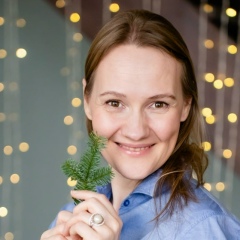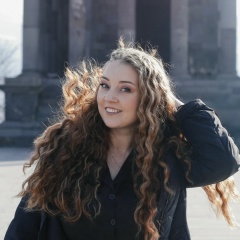Побывала на #Русскаяматрица. Тема в общем-то классическая, об особенностях русской души, которая сама не знает чего хочет, показана через призму русских сказок, однако не в детском восприятии, а в осознанном взрослом прочтении. Сценография по стандартной для режиссера Андрея Прикотенко схеме: зрители сидят в плотном кольце прямо на сцене как бы внутри действия, над головами - видеопроекция, скорее всего, чтоб лучше было видно галерке, а не ради какого-то смысла.
Сначала действие напоминало студенческий капустник: молодые актеры скользят на гироскутерах и что-то поют, со сцены льются неологизмы вперемежку со стихами в стиле Александра Сергеевича, актерская игра в классическом понимании отсутствует полностью, казалось бы, какие-то студенческие читки, пробы сценария, прощупывание диалогов, подбор слов ... «тошно-матошно», «говорить не переговорить» (а какие виртуозные ругательства там были!). Но обманчивое первое впечатление вскоре сформировалось в цельную картину. Иван отправляется в путешествие за правдой (туда не знаю куда), встречает Жар-Птицу, Волка, Ягу, Гору, Змея, у каждого персонажа своя правда, свой взгляд на мир и свои ценности. Опережая риторические вопросы зрителя, как бы вдруг между сценами появляется мужичок в лице неподражаемого Александра Новикова, который разъясняет зрителю что к чему, является своего рода рассказчиком, связующим звеном и голосом режиссера.
Гора-Богатырь предлагает поговорить ради поговорить, выпить, авось смысл откроется, созерцать вместо того, чтобы совершить подвиг и сдвинуться с места, – ведь этот выбор точно не принесет никому вреда, так что можно расслабиться и плыть по течению. Змей говорит, что счастье людей зависит от власти, и это только их проблема – страх перед сильными мира, станешь властью – обретешь счастье. Просто восхитителен Воробей, клюющий Гору-Богатырь,– превосходный образ ленивых и убогих, которые предпочитают сидеть на шее, пользуясь человеческой добротой – в этом его смысл. Волшебная Баба Яга с великолепным польским акцентом мечтает о простом женском счастье, без которого она превращается в «маньяка».
Очень понравился Кош (Кощеюшка) в виде такого Карла Лагерфельда, в черных очках, декламирующего манифест об испорченном человечишке и поганом мире, который вот-вот развалится, и тогда-то и смерть его придет, да очистится земля русская. Да и конь с царем Долматом, Жар-Птица тоже удались. Иван запутывается: Кош говорит ему про смерть, Баба-яга про секс, Змей про власть… И добавочка – юродивый, который внутри красивый, а внешне не очень, в отличие от нашего героя Ивана Дурака. Именно юродивый предстает неким сталкером в мир правды – то есть потусторонний мир, читает «молитву» и звонит в колокола. Тема церкви неявно прослеживается и в финале, на сцену выносят балки в виде огромных церковных свечей.
Так что же нашел Иван в этом путешествии? Собрал ли свой собственный пазл, а заодно и матрицу поведения русского человека? Нет, он так и не понял ничего, буквы расплылись по стенам, так и не сложившись в слова, смысл… Наш герой знает, что ничего не знает. Равно как и типичный русский «дурак», у которого нет четких целей, а весь смысл долгого пути длиною в жизнь в поиске света в темноте.
#РусскаяМатрица #ТеатрЛенсовета
Сначала действие напоминало студенческий капустник: молодые актеры скользят на гироскутерах и что-то поют, со сцены льются неологизмы вперемежку со стихами в стиле Александра Сергеевича, актерская игра в классическом понимании отсутствует полностью, казалось бы, какие-то студенческие читки, пробы сценария, прощупывание диалогов, подбор слов ... «тошно-матошно», «говорить не переговорить» (а какие виртуозные ругательства там были!). Но обманчивое первое впечатление вскоре сформировалось в цельную картину. Иван отправляется в путешествие за правдой (туда не знаю куда), встречает Жар-Птицу, Волка, Ягу, Гору, Змея, у каждого персонажа своя правда, свой взгляд на мир и свои ценности. Опережая риторические вопросы зрителя, как бы вдруг между сценами появляется мужичок в лице неподражаемого Александра Новикова, который разъясняет зрителю что к чему, является своего рода рассказчиком, связующим звеном и голосом режиссера.
Гора-Богатырь предлагает поговорить ради поговорить, выпить, авось смысл откроется, созерцать вместо того, чтобы совершить подвиг и сдвинуться с места, – ведь этот выбор точно не принесет никому вреда, так что можно расслабиться и плыть по течению. Змей говорит, что счастье людей зависит от власти, и это только их проблема – страх перед сильными мира, станешь властью – обретешь счастье. Просто восхитителен Воробей, клюющий Гору-Богатырь,– превосходный образ ленивых и убогих, которые предпочитают сидеть на шее, пользуясь человеческой добротой – в этом его смысл. Волшебная Баба Яга с великолепным польским акцентом мечтает о простом женском счастье, без которого она превращается в «маньяка».
Очень понравился Кош (Кощеюшка) в виде такого Карла Лагерфельда, в черных очках, декламирующего манифест об испорченном человечишке и поганом мире, который вот-вот развалится, и тогда-то и смерть его придет, да очистится земля русская. Да и конь с царем Долматом, Жар-Птица тоже удались. Иван запутывается: Кош говорит ему про смерть, Баба-яга про секс, Змей про власть… И добавочка – юродивый, который внутри красивый, а внешне не очень, в отличие от нашего героя Ивана Дурака. Именно юродивый предстает неким сталкером в мир правды – то есть потусторонний мир, читает «молитву» и звонит в колокола. Тема церкви неявно прослеживается и в финале, на сцену выносят балки в виде огромных церковных свечей.
Так что же нашел Иван в этом путешествии? Собрал ли свой собственный пазл, а заодно и матрицу поведения русского человека? Нет, он так и не понял ничего, буквы расплылись по стенам, так и не сложившись в слова, смысл… Наш герой знает, что ничего не знает. Равно как и типичный русский «дурак», у которого нет четких целей, а весь смысл долгого пути длиною в жизнь в поиске света в темноте.
#РусскаяМатрица #ТеатрЛенсовета
Visited #Russian Matrix. The theme is generally classical, about the features of the Russian soul, which itself does not know what it wants, is shown through the prism of Russian fairy tales, but not in children's perception, but in a conscious adult reading. Scenography according to the standard scheme for the director Andrei Prikotenko: viewers are sitting in a tight ring right on the stage as if inside an action, above their heads - a video projection, most likely to be better visible to the gallery, and not for the sake of any meaning.
At first, the action resembled a student skit: young actors glide on gyro scooters and sing something, neologisms flow from the stage interspersed with verses in the style of Alexander Sergeyevich, the acting game in the classical sense is completely absent, it would seem that some student readings, sample scripts, probing dialogues, the selection of words ... "sickly-naughty", "say no talk" (and what a virtuoso curse there!). But the deceptive first impression soon formed into a whole picture. Ivan goes on a journey for the truth (I don’t know where), meets the Firebird, Wolf, Yaga, Mountain, Snake, each character has his own truth, his own view of the world and his values. Ahead of the rhetorical questions of the viewer, as if suddenly a peasant appears between the scenes in the person of the inimitable Alexander Novikov, who explains to the viewer what’s what, is a kind of storyteller, a connecting link and voice of the director.
Mount Bogatyr offers to talk for the sake of talking, to drink, maybe the meaning will open, to contemplate instead of making a feat and moving forward - after all, this choice will certainly not harm anyone, so you can relax and go with the flow. The serpent says that the happiness of people depends on power, and this is only their problem - fear of the powers that be in the world, if you become power, you gain happiness. The Sparrow, pecking the Mountain-Bogatyr, is simply delightful - an excellent image of the lazy and wretched, who prefer to sit on their necks, using human kindness - this is its meaning. The magical Baba Yaga, with a magnificent Polish accent, dreams of simple female happiness, without which she turns into a "maniac".
I really liked Kosh (Koscheyushka) in the form of such Karl Lagerfeld, wearing black glasses, reciting a manifesto about a spoiled little man and a filthy world that was about to fall apart, and then his death would come, so that the Russian land would be cleansed. Yes, and the horse with Tsar Dolmat, the Firebird also failed. Ivan gets confused: Kosh tells him about death, Baba Yaga about sex, Serpent about power ... And the supplement is a holy fool who is beautiful inside, but not very outwardly, unlike our hero Ivan the Fool. It is the holy fool who appears as a kind of stalker into the world of truth - that is, the other world, reads “prayer” and rings the bells. The theme of the church is also implicitly traced in the finale, beams are brought onto the stage in the form of huge church candles.
So what did Ivan find on this journey? Did you assemble your own puzzle, and at the same time, the behavior matrix of a Russian person? No, he didn’t understand anything, the letters spread out on the walls, and did not form words, the meaning ... Our hero knows that he knows nothing. As well as the typical Russian "fool", who has no clear goals, and the whole point of a long journey of a lifetime in the search for light in the dark.
#RussianMatrix #Lensoviet Theater
At first, the action resembled a student skit: young actors glide on gyro scooters and sing something, neologisms flow from the stage interspersed with verses in the style of Alexander Sergeyevich, the acting game in the classical sense is completely absent, it would seem that some student readings, sample scripts, probing dialogues, the selection of words ... "sickly-naughty", "say no talk" (and what a virtuoso curse there!). But the deceptive first impression soon formed into a whole picture. Ivan goes on a journey for the truth (I don’t know where), meets the Firebird, Wolf, Yaga, Mountain, Snake, each character has his own truth, his own view of the world and his values. Ahead of the rhetorical questions of the viewer, as if suddenly a peasant appears between the scenes in the person of the inimitable Alexander Novikov, who explains to the viewer what’s what, is a kind of storyteller, a connecting link and voice of the director.
Mount Bogatyr offers to talk for the sake of talking, to drink, maybe the meaning will open, to contemplate instead of making a feat and moving forward - after all, this choice will certainly not harm anyone, so you can relax and go with the flow. The serpent says that the happiness of people depends on power, and this is only their problem - fear of the powers that be in the world, if you become power, you gain happiness. The Sparrow, pecking the Mountain-Bogatyr, is simply delightful - an excellent image of the lazy and wretched, who prefer to sit on their necks, using human kindness - this is its meaning. The magical Baba Yaga, with a magnificent Polish accent, dreams of simple female happiness, without which she turns into a "maniac".
I really liked Kosh (Koscheyushka) in the form of such Karl Lagerfeld, wearing black glasses, reciting a manifesto about a spoiled little man and a filthy world that was about to fall apart, and then his death would come, so that the Russian land would be cleansed. Yes, and the horse with Tsar Dolmat, the Firebird also failed. Ivan gets confused: Kosh tells him about death, Baba Yaga about sex, Serpent about power ... And the supplement is a holy fool who is beautiful inside, but not very outwardly, unlike our hero Ivan the Fool. It is the holy fool who appears as a kind of stalker into the world of truth - that is, the other world, reads “prayer” and rings the bells. The theme of the church is also implicitly traced in the finale, beams are brought onto the stage in the form of huge church candles.
So what did Ivan find on this journey? Did you assemble your own puzzle, and at the same time, the behavior matrix of a Russian person? No, he didn’t understand anything, the letters spread out on the walls, and did not form words, the meaning ... Our hero knows that he knows nothing. As well as the typical Russian "fool", who has no clear goals, and the whole point of a long journey of a lifetime in the search for light in the dark.
#RussianMatrix #Lensoviet Theater


У записи 5 лайков,
0 репостов,
420 просмотров.
0 репостов,
420 просмотров.
Эту запись оставил(а) на своей стене Мария Белка-Штайер


























